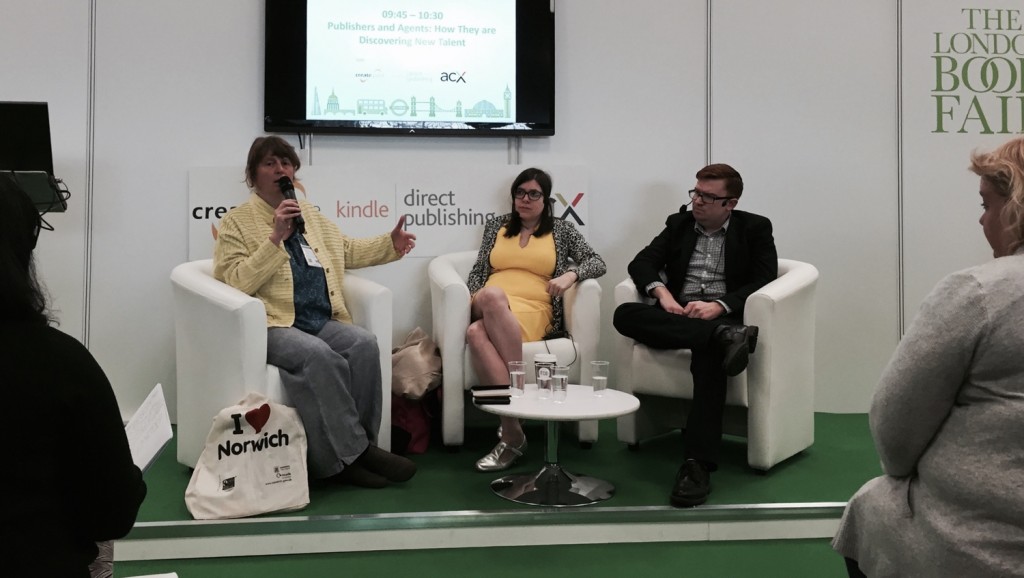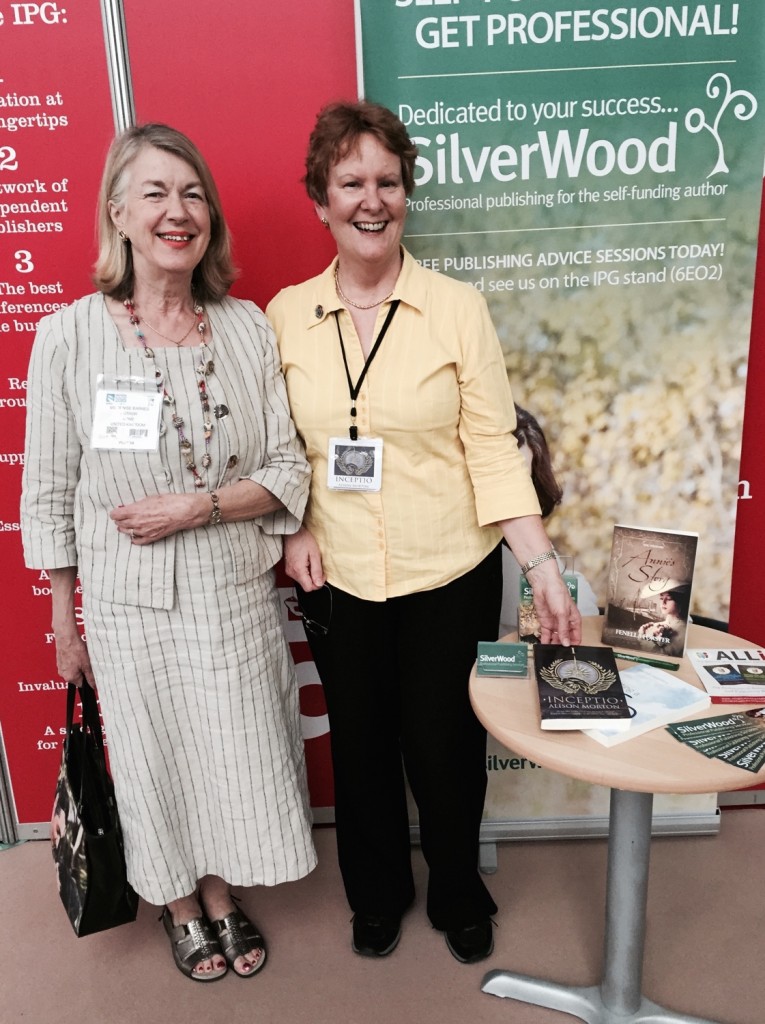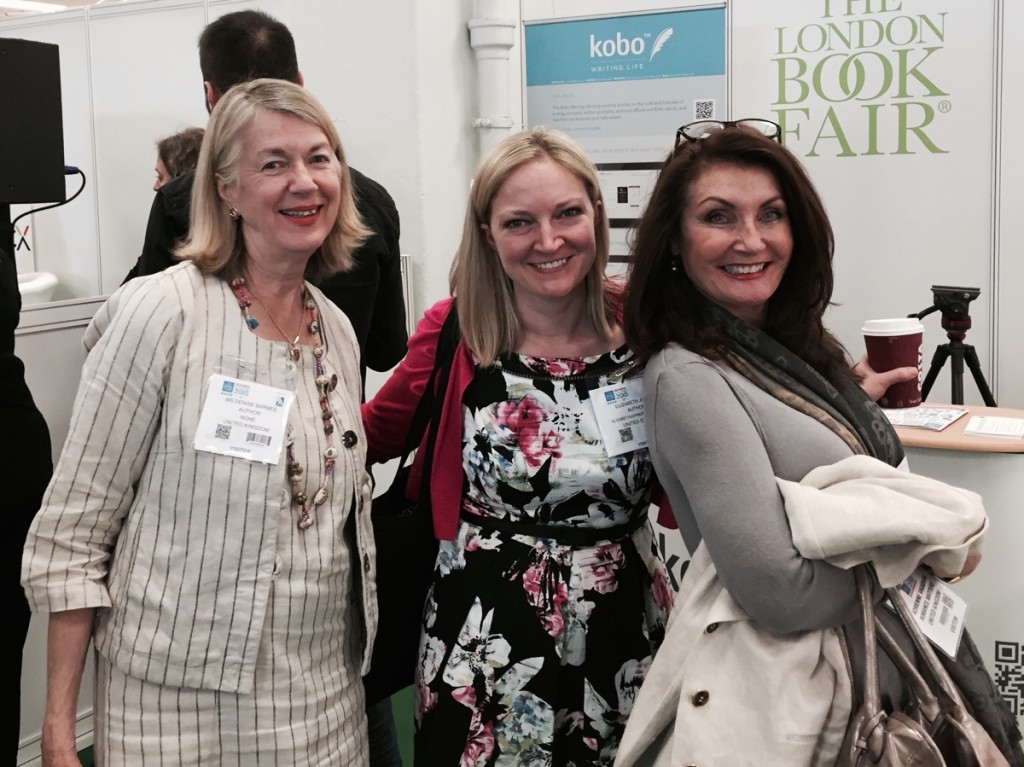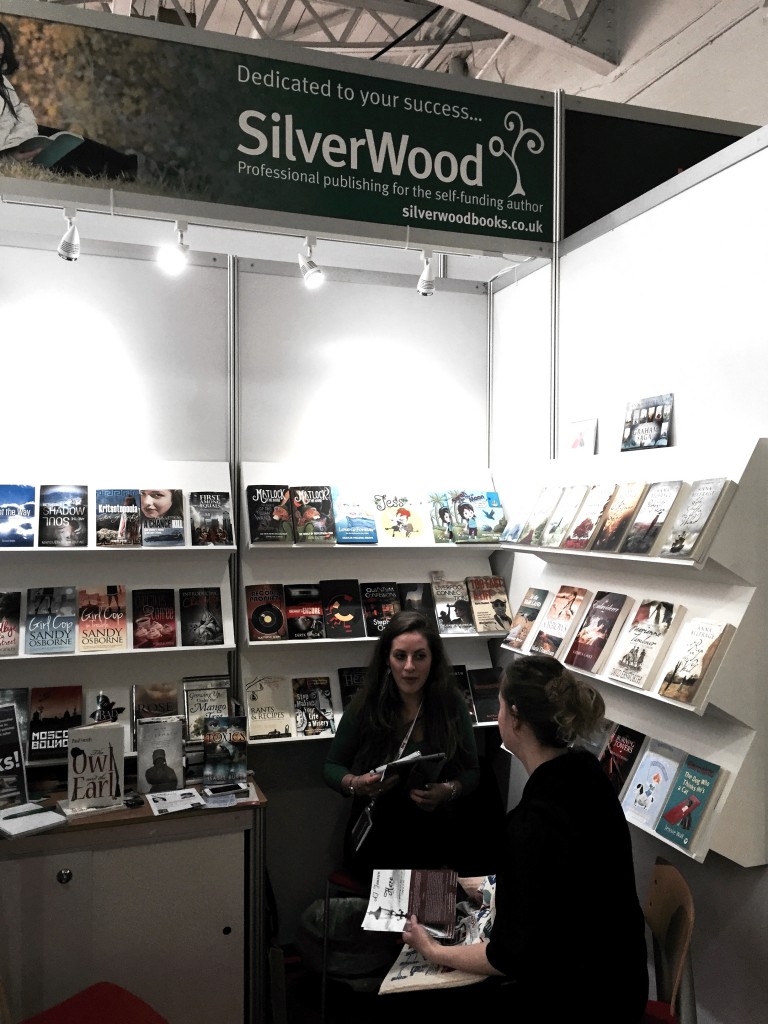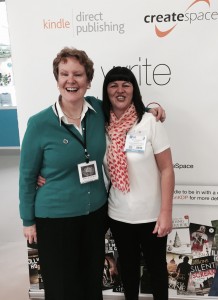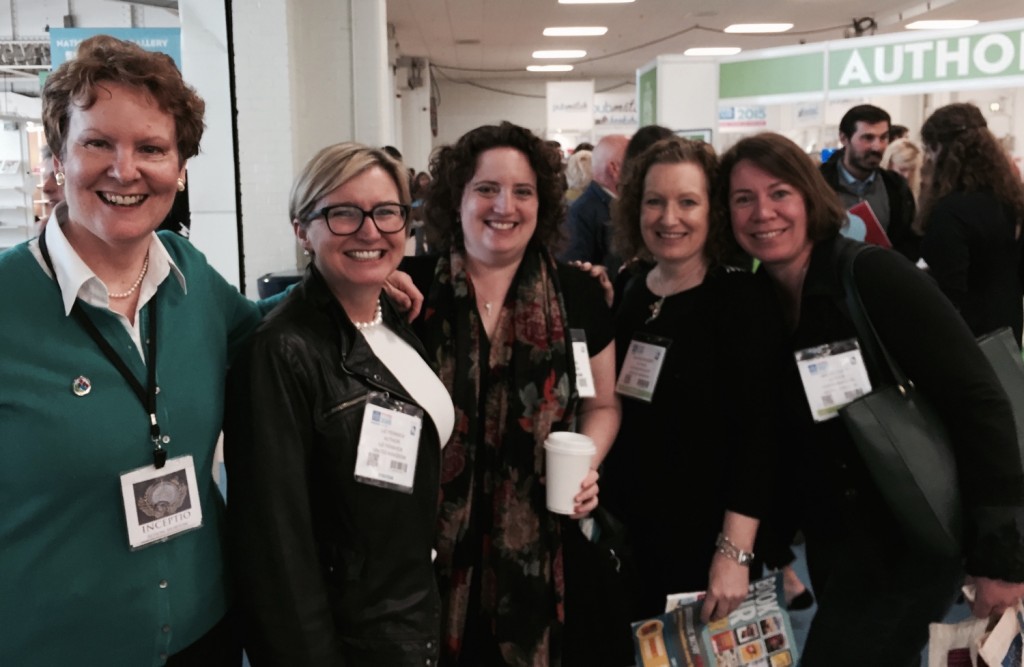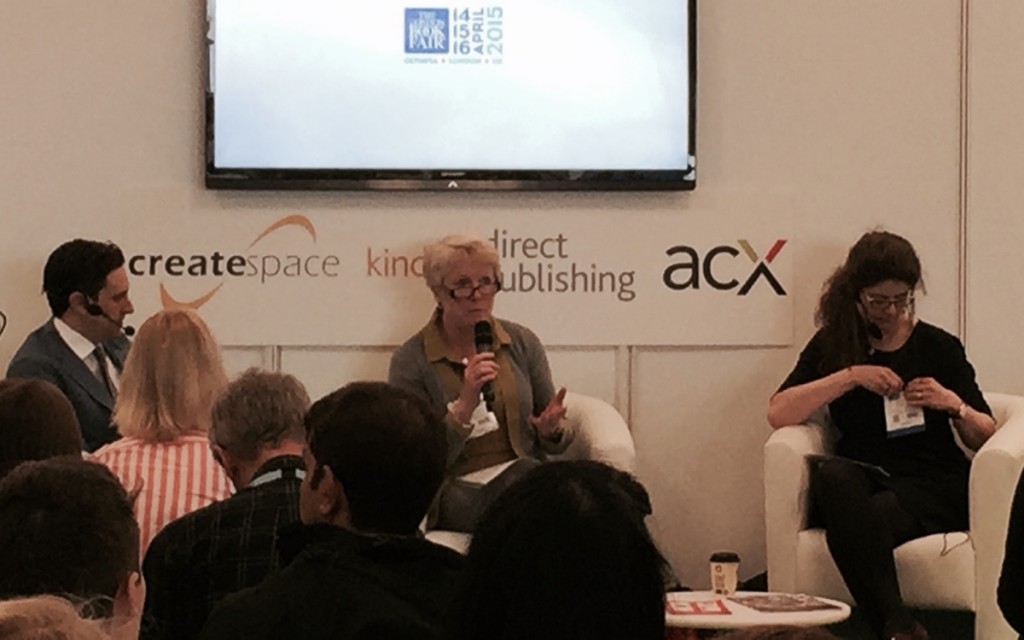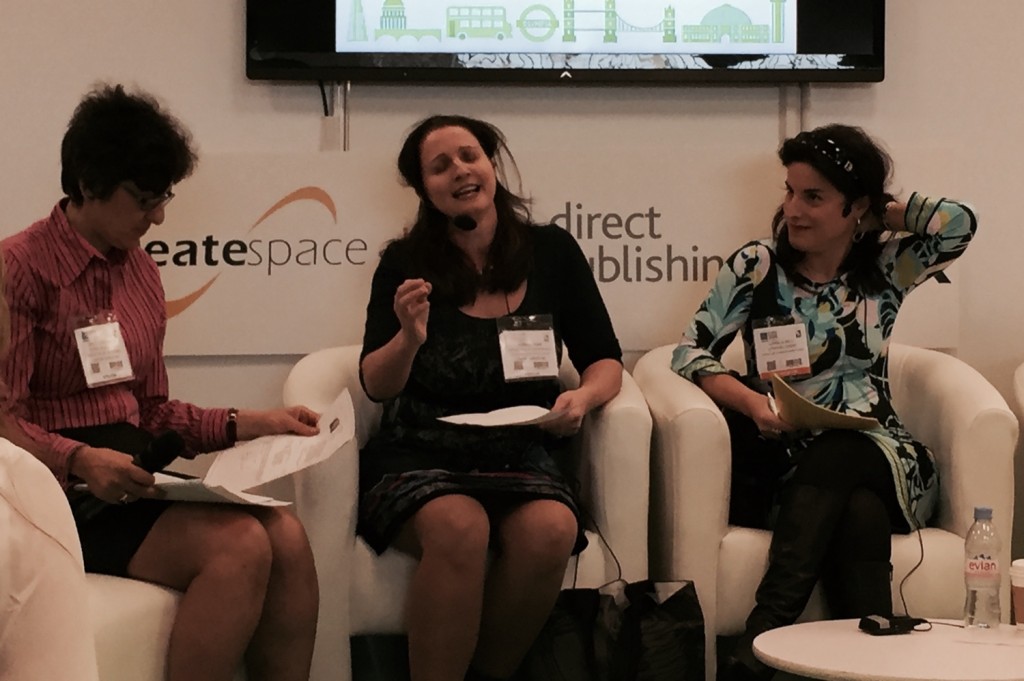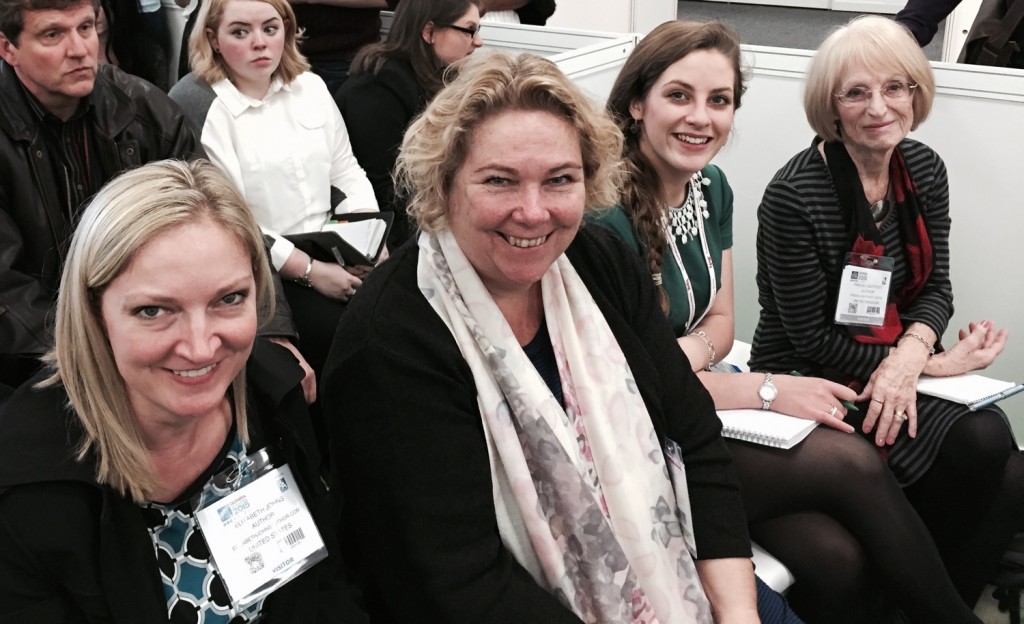 Kathryn Gauci was born in England. After studying textile design at Loughborough College of Art, she worked in Athens as a carpet designer for six years and after much travelling settled down to run her own textile design studio in Melbourne for fifteen years. She now lives in Australia with her husband. The Embroiderer is her first novel; a culmination of those wonderful years of design and travel, and especially of those glorious years in her youth living and working in Greece – a place that she is proud to call her spiritual home.
Kathryn Gauci was born in England. After studying textile design at Loughborough College of Art, she worked in Athens as a carpet designer for six years and after much travelling settled down to run her own textile design studio in Melbourne for fifteen years. She now lives in Australia with her husband. The Embroiderer is her first novel; a culmination of those wonderful years of design and travel, and especially of those glorious years in her youth living and working in Greece – a place that she is proud to call her spiritual home.
Welcome Kathryn! Congratulations on the publication of The Embroiderer.
What fascinates you about Greece and the Ottoman Empire?
From 1972-78, I worked as a carpet designer in Athens. The factory was situated in the suburb of Kalogreza/Nea Ionia. The word nea in Greek means new – “New Ionia”. In Athens, there are several such suburbs, Nea Smyrni, Nea Filadelphia, etc., and they are all named after towns or areas in Turkey. When I was told that I was working in a refugee area, I was surprised.
“But these people are Greeks,” I replied in astonishment. ‘How can they be refugees in their own country?”
That was the beginning of a long learning curve about Greek/Turkish relations which, forty years later, I am still fascinated with. Most of the refugees arrived in Greece in 1922 after The Asia Minor Catastrophe and as I was to discover, this was an episode of such magnitude that it changed both Greece and Turkey forever.
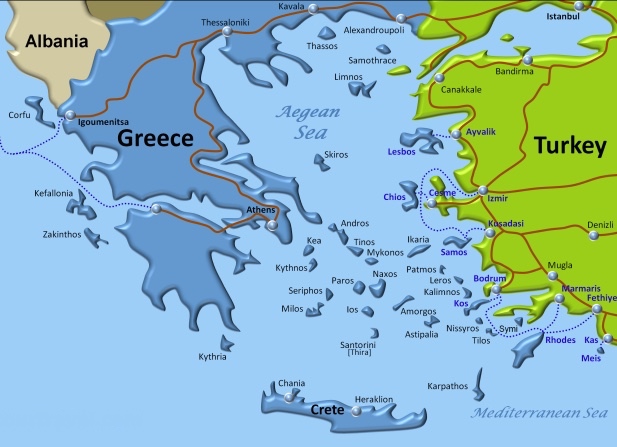
In 1919, after a brief entry into WWI on the side of the Allies, Greek troops occupied Smyrna (present day Izmir) and the surrounding area along the coast and inlands towards Angora (Ankara). When winter set in, the troops rested, gathering their strength for a spring offensive. Little did they know that Mustafa Kemal was amassing his troops for his own offensive. The result was a catastrophic defeat for the Greeks. Within a matter of weeks, the dejected remnants of the Greek Army returned to Smyrna awaiting ships to take them back to Greece. One week later, the richest and most cosmopolitan city in the Ottoman Empire, lay in ruins. A fire which began in the Armenian Quarter quickly spread throughout the city destroying everything except for the Turkish Quarter. In the course of a few weeks, 1,500.000 Greeks fled to Greece.
Almost a year later, the old Ottoman ministries were closed, the Sultan was in exile and the Nationalists under Ataturk were in power. In this new landscape, there was no room for troublesome minorities and under an agreement signed in Lausanne by both Greece and Turkey, all of Turkey’s Orthodox Christians were forced to leave their ancestral lands whilst in Greece, 400,000 Muslims were forced to leave for Turkey. A special exemption allowed the Greeks from Constantinople and the Orthodox Patriarchate to remain there, and a few Muslims were allowed to stay in Western Thrace. The upheaval ended more than two thousand years of Greek presence in the region. The end was swift and it was brutal.
The stories of the last days in Smyrna and of the lives led before the Catastrophe were the stories I heard in Athens. Despite everything, that yearning for their ancestral homeland never went away.
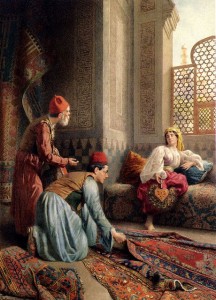
The Carpet Sellers, Francesco Ballesio (1830-1923 (from the author’s website)
My work as a carpet and textile designer gave me a further insight into the Ottoman Empire. The history of textiles, and in particular, carpets, spans an area from Spain to China. Because of the nature of the art, one learns about everything from tribal migrations to the rise and fall of empires. The Ottoman Empire was a great trading empire covering a strategic part of the silk road on the one hand and trading with the west on the other, particularly, the Venetians. The Ottoman Turks had such a passion for decoration that it was often venerated in the works of great poets: architecture, weaponry, ceramics, garden art, calligraphy, cuisine, textiles and of course, embroidery.
In The Embroiderer, the intricate and rich world of silks and luxury, and equally rich Greek heritage, link Dimitra, Eleni and Sophia – your heroines… Where do the characters come from? Are they entirely imaginary?
The heroines are all women of their time. Each generation was different because the scope of their lives was different. With each generation, the women gained more freedom. In a changing and tumultuous world, their goals were different. I chose to set them in a world of textiles as that was really the only area where a woman was encouraged to excel – music was another, but that was usually in the upper echelons of society. And as a couturier, Sophia’s work amongst the privileged classes ultimately helped her work in the underground.
How did you research the materials and decorative use of embroidery used and worn at the time?
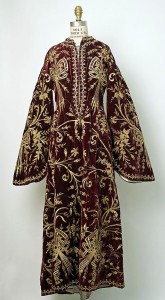
Gold on velvet embroidery, mid 19th century (from the author’s website)
I studied textiles at art college and first developed an interest in embroidery when I was at Loughborough College of Art. In those days, embroidery was beginning to take on an abstract art form. Some of the designers went on to do ecclesiastical work, others went into the fashion industry. Research never stops. Books, museums; I can never have enough of these. The types of fabrics and embroidery mentioned in The Embroiderer are true to the period.
Do you think fiction does anything to help us understand the past or is it purely entertainment?
I believe that setting this period into fiction has enabled readers to understand the tumultuous times and lives of the characters. I wanted to make people feel that they knew about history without having read a history book. I am a believer that fiction can bring history alive. It touches the senses if we can live and breathe the characters. Historical fiction should also entertain. If it doesn’t hold us it has no meaning.
What is the hardest part of the writing process for you?
Getting the voice right. Each generation had to inhabit their time; they would have thought differently. Artemis would have been far more restrained than Dimitra. Likewise, Sophia took more chances than her grandmother, and Eleni was a modern woman.
So what’s The Embroiderer about?
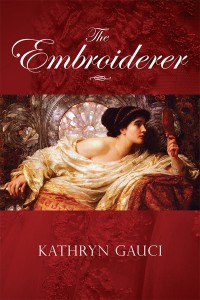 Set against the mosques and minarets of Asia Minor and the ruins of ancient Athens, The Embroiderer is a gripping saga of love and loss, hope and despair, and of the extraordinary courage of women in the face of adversity.
Set against the mosques and minarets of Asia Minor and the ruins of ancient Athens, The Embroiderer is a gripping saga of love and loss, hope and despair, and of the extraordinary courage of women in the face of adversity.
1822: During one of the bloodiest massacres of The Greek War of Independence, a child is born to a woman of legendary beauty in the Byzantine monastery of Nea Moni on the Greek island of Chios. The subsequent decades of bitter struggle between Greeks and Turks simmer to a head when the Greek army invades Turkey in 1919.
During this time, Dimitra Lamartine arrives in Smyrna and gains fame and fortune as an embroiderer to the elite of Ottoman society. However it is her granddaughter, Sophia, who takes the business to great heights only to see their world come crashing down with the outbreak of The Balkan Wars, 1912-13. In 1922, Sophia begins a new life in Athens but the memory of a dire prophecy once told to her grandmother about a girl with flaming red hair begins to haunt her with devastating consequences.
1972: Eleni Stephenson is called to the bedside of her dying aunt in Athens. In a story that rips her world apart, Eleni discovers the chilling truth behind her family’s dark past plunging her into the shadowy world of political intrigue, secret societies and espionage where families and friends are torn apart and where a belief in superstition simmers just below the surface.
Published by SilverWood Books – Bristol BS1 4HJ United Kingdom, and available from all good bookstores and online retailers.
More about Kathryn and her fascinating world: www.kathryngauci.com
Connect with Kathryn: on Facebook and via Twitter @KathrynGauci
Thank you for being my guest today, Kathryn, and good luck with The Embroiderer.
Alison Morton is the author of Roma Nova thrillers, INCEPTIO, PERFIDITAS and SUCCESSIO. The fourth book, AURELIA, is due out in May 2015.
Find out more about Roma Nova, its origins, stories and heroines…
If you enjoyed this post, do share it with your friends!
Like this:
Like Loading...
 This may possibly be classified as a rant …
This may possibly be classified as a rant …